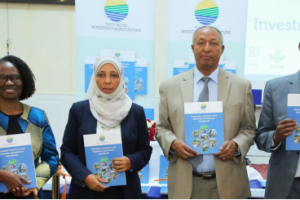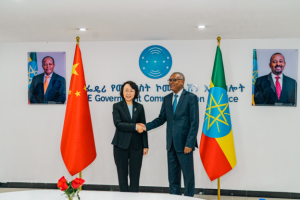
The same countries that advocated for globalization and had helped to create it are turning against it. Frustrated by the pressure from the poor, lower middle class and as means of luring them into some sort of chauvinistic nationalism, some governments have embraced national exclusiveness as a tool to safeguard the interest of their political power house.
On the other hand, globalization has proved that it is not in favor of the world’s poor. Recent 106 pages reports released by the World Economic Forum indicate that “The world’s billionaires are growing $2.5 billion richer every day, while the poorest half of the global population is seeing its net worth dwindle.
The combined fortunes of the world’s 26 richest individuals reached $1.4 trillion last year — the same amount as the total wealth of the 3.8 billion poorest people.” Klaus Schwab, the founder of the World Economic Forum identifies the difference between globalism and globalization “Globalism is an ideology that prioritizes the neoliberal global order over national interests,” while “globalization is a phenomenon driven by technology and the movement of ideas, people, and goods.” It needs rules to harness its benefits and mitigate its excesses, but its advance is relentless. Trade protectionism and tariff wars will always add costs to global supply chains and are likely reduce profits.
The world economic order is showing the signs of fracturing while international business atmosphere is wary of trade wars. Climate change is wreaking havoc, the global economy is slowing sharply, and central banks may not be in position to respond effectively if there’s a big recession. This year’s World Economic Forum was held under the back drop of a bleak world economic order.
Prior to attending this year’s World Economic forum which was organized at Devos with theme ““Globalization 4.0: Shaping a Global Architecture in the Age of the Fourth Industrial Revolution.” Prime Minister Dr. Abiy paid a working visit to a number of EU countries. During his visit to Italy PM Abiy Ahmed was received by H.E. Giuseppe Conte in an official welcoming ceremony.
The two counterparts held bi-lateral & agreed to take their cooperation to the next level in the Addis Ababa – Massawa railway line. The Premier made a courtesy visit with the President of the Italian Republic Sergio Mattarella at Quirinal Palace. Both recounted the historical relationship b/n the two countries and continued cooperation in key social and economic areas of development. PM Abiy Ahmed met with His Holiness Pope Francis, head of the Catholic Church & sovereign of the Vatican City. He also held discussions with Cardinal Pietro Parolin, Secretary of State of the Holy See.
The discussion focused on issues of common interest to both States. The President of the European Commission, Jean-Claude Juncker met with the Prime Minister of Ethiopia Abiy Ahmed to discuss EU support to Ethiopia’s reform process and agree to an additional €130 million to support job creation. On this occasion, President Juncker said: “The partnership between Ethiopia and the EU is particularly strong and the meeting with Prime Minister Abiy today allowed us to exchange on how to further deepen it.
The EU supports the ambitious reform agenda in Ethiopia and is committed to step up its support to the country”. Commissioner for International Cooperation and Development, Neven Mimica and Ethiopian Minister of Foreign Affairs Dr. Workneh Gebeyehu Negewo furthermore signed to promote sustainable economic growth and job creation in the country for a total amount of €130 million. The 3 new programs signed are part of the implementation of the ‘Africa-Europe Alliance for Sustainable Investment and Jobs’, which aims to deepen the economic and trade relations between the two continents, in order to create sustainable jobs and growth.
These financing agreements between the EU and Ethiopia support job creation (€50 million), sustainable energy (€35 million) and the establishment of agroindustrial parks in Ethiopia (€45 million). During Prime Minister Abiy Ahmed’s first visit to the EU institutions, he also met with High Representative/Vice-President, Federica Mogherini, Commissioner for International Cooperation and Development, Neven Mimica, as well as Council President, Donald Tusk. In another development, PM Abiy Ahmed met with Director General of the Food and Agriculture Organization of the United Nations, Mr. José Graziano da Silva who appreciated the role being played by Ethiopia in the Horn region and the political leadership of the prime minister.
PM Abiy Ahmed met with Mr. Gilbert F. Houngbo, President of International Fund for Agricultural Development (IFAD) both agreeing to continue bldg on the performance of Ethiopia in addressing needs of poor communities. PM Abiy Ahmed met with World Food Program (WFP) Executive Director Mr. David Beasley. WFP has been playing a critical role in supporting Ethiopia address food security, nutrition & capacity building interventions PM Abiy Ahmed appreciated. On the sidelines of World Economic Forum in Davos, PM Abiy Ahmed met and held discussion with Mr Mohammed Al Shaibani, CEO of Investment Corporation of Dubai—a 200 Billion Sovereign Fund.
ICD is keen to invest in hospitality and agrobusiness industry in Ethiopia Speaking to the world on the second day of the World Economic Forum, Prime Minister expounded on the three pillars of the ongoing reform program in the country. He stated that ensuring vibrant democracy, promotion of economic vitality, regional integration and openness to the world. The implementation of these pillars is not only highly critical to sustain the reforms program in the country but also touches upon the entire socio-economic development of the nation. Ethiopia is not announcing these pillars for the first time as they are already being implemented in the country. Ethiopia is already spearheading in the economic integration of East Africa. The country is already working on hydro power grid to share energy with the rest of East Africa and possibly beyond. Aviation, Railway and highway networking is already in view of the lofty goals of the African Free Trade Area.
As the global economy is bracing for recession, Ethiopia and Africa could be affected as the developed countries will be entangled in their own struggle for fast economic recovery. Davos indicated that the global economic systems will certainly continue to marginalize the less developed countries. Although a number of African countries have shown a steady economic growth many of them including Ethiopia are devoting a huge amount of their GDP for either debt servicing or directly paying their debts. Although a number of African countries have managed to lure FDI into their countries over the last couple of years, they are still trapped in the vicious circle of debt and this may continue over the coming years. Corruption and contraband, lack of good governance, lower level of exports, dwindling prices for agricultural products, internal displacements triggered by local conflicts are already the common challenges that both Ethiopia and Africa are facing.
Coupled with all these challenges, both Africa and Ethiopia are still struggling with the aftermath of natural and manmade calamities. The annual meetings that have been conducted over the previous several years have helped to highlight the major socioeconomic problems that the world is facing.
This is a high time that the forum needs to focus on the specific problems of the less developed countries that have not contributed to climate change and its adverse effects. Of course, this year’s World Economic Forum has indicated both the developed and developing countries have incompatible interests but there are areas in which they should cooperate if they have to ensure the sustained well being of the global population. It has been decided that the next World Economic Forum will be held in Addis Ababa.
The Ethiopian Herald January 29 /2019
BY SOLOMON DIBABA





